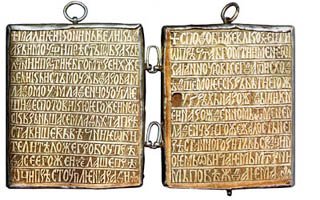
|
Cyril & Methodius
Cyril (827-869)
Methodius (815-885)
14th February
 It
is not given to many of us to leave a legacy defining the language and
culture of half a continent. But two brothers did this, not for personal
power or with the intention of founding a dynasty, but so that ordinary
people could worship God in their own language.
It
is not given to many of us to leave a legacy defining the language and
culture of half a continent. But two brothers did this, not for personal
power or with the intention of founding a dynasty, but so that ordinary
people could worship God in their own language.
Cyril and Methodius were brothers from Thessalonica who, in their youth, developed an ability to speak several languages, including Slavonic which at that time was not written down. Before becoming ordained priests, Methodius born c.815 was a provincial governor, while the younger Cyril born c.825 a distinguished professor of philosophy in Constantinople. In 863 they were sent by the Eastern patriarch Photius as missionaries to the Slavs following a request by Prince Rostislav of Great Moravia. They started translating the scriptures into the language we now know as Old Church Slavonic and began using Slavonic in the liturgy. At the same time they invented Slavonic alphabets (Cyrillic and Glagolitic) derived from Greek characters so that the local language could be written down.
Their work caused offence to German missionaries and their patron, the Archbishop of Salzburg, who wanted to enforce the exclusive use of Latin liturgy and extend the influence of the German empire over the Slav people. In 867 Pope Nicholas I summoned them both to Rome to settle the dispute, but by the time they arrived Adrian II had assumed the papacy and ruled in favour of the brothers and their use of the local language in liturgy.
Cyril died in Rome in 869 but Methodius was sent as papal legate and Archbishop to a province covering all Moravia, at that time the largest distinctive nation in the region, where he completed translation of the Bible. However, German clergy continuing their opposition had Methodius arrested, tried, imprisoned and treated quite brutally before Pope John VIII intervened to free him and restore his authority. Even then his own suffragan bishop, Wiching, continued to make trouble - including forgery of papal documents and, on succeeding Methodius after his death in 884, forbade the use of Slavic liturgy and forced the disciples of Cyril and Methodius into exile.
However, the influence of the brothers had spread widely - to Croatia, Bohemia, Poland, through the Balkans and as far as Kiev in Russia - so it has endured. It is difficult to underestimate the significance of their work, for Slavic is the basis of modern Russian, Polish, Ukrainian, Bulgarian, Czech, Slovak, Serbian and other languages, and through them the evolution of literature and culture in the region. The original alphabet developed by Cyril has evolved into the Cyrillic script used today in much of Eastern Europe and the former Soviet Union and notably in the Eastern Orthodox Churches that serve them.
Cyril and Methodius were Greeks, under the authority of a Roman Pope, working in collaboration with the Eastern Church hierarchy. In some way they epitomised bridge-building and connection between different and often competing influences, so it is hardly surprising that they are now seen as patron saints of ecumenism between the Eastern and Western branches of Christendom.
We may not emulate their achievements but we can strive for the same ends - seeking to make the church intelligible and accessible to people wherever they are, realising the gospel in the language of that place and that day. Liturgy need not be alien or strange - to worship God we need no language but our own.
Return to the Articles contents page
http://www.stpetersnottingham.org/saints/cyril.html
© St Peter's Church, Nottingham
Last revised 2nd February 2000